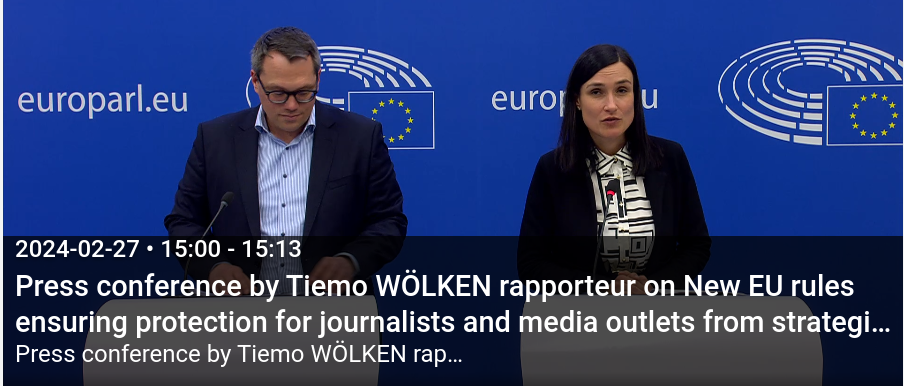Major win for civil society as EU passes anti-SLAPP Directive
More than six years after Maltese investigative journalist Daphne Caruana Galizia, the European Parliament has voted by an overwhelming margin to adopt #DaphnesLaw.
At the time Daphne was assassinated, she was target of 43 civil and five criminal libel suits, all aimed at stifling her scrutiny of Malta's political class. The EU Anti-SLAPP Directive, which will now become law later in the Spring, aims to offer greater protection - not only to journalists, but to human rights defenders and others exercising their right to freedom of expression - against abusive litigation that intends to keep them quiet.
In a short press conference this afternoon, Tiemo Woelken MEP, the European Parliament's rapporteur on the Anti-SLAPP Directive, outlined what he saw as the objectives and key points of the agreement.
"This Directive was intended to prevent the misuse of power by powerful indivuduals, politicians, welathy companies, who can afford to sue journalists and silence criticism."
After praising the strength of the Parliament vote ("we can really say that this law is broadly supported") and paying tribute to Daphne Caruana Galizia, Woelken hailed the agreement of a common definition of SLAPP cases, which means that achieving a definitive count of the frequency of SLAPP cases across Europe will be possible for the first time.
Not only is a set definition key for information-gathering, it provides a measure of certainty to the defence lawyers and judges facing these cases on the ground.
In what Woelken said was "a very intense and tough negotiation", the agreed text of the law will cover SLAPP cases to the greatest extent possible under EU law. This means that the Directive's coverage will be limited to "cross-border" cases - which civil society has estimated account for about one tenth of cases - with domestic SLAPP suits falling outside the remit of the Directive.
As with every EU Directive, member states will now be required to pass legislation implementing the Directive's provisions in their own national law. Woelken told the media that a number of member states had already provided him with assurances that they will extend the scope of protections to cover purely national cases.
"I honestly believe," he said, "that this is only a common minimum standard and in many member states there will be additional protections for national SLAPP cases"
In addition, the agreed Directive text includes specific protections for material that is published by electronic means, so statements shared online will attract protection under the Directive.
The new Directive offers two main rememdies for SLAPP targets: the possibility of early dismissal for "manifestly unfounded" litigation and provisions for the reimbursement of costs. Both are aimed at minimising the time and expense that SLAPP litigants typically seek to inflict on their targets. Penalties will also be available for those who initiate SLAPP suits.
Finally, the text includes provision for the protection of SLAPP targets resident in the EU from judgments made in non-EU countries.
The Directive is expected to be entered on the EU's official record in the next couple of months. EU member states will then have two years in which to transpose the Directive - passing their own national laws to implement the EU provisions. Experience from passage of the EU Whistleblowing Directive suggests that the transposition process in individual member states will be worth watching closely.
Pioneering Anti-SLAPP training in 11 EU member states
New legal remedies for are important, but can only ever be as effective as lawyers' ability to use them. For the past two years, Blueprint for Free Speech has been one of 11 organisations - 10 civil society organisations and one university - trying to plug that gap.
In addition to training 364 lawyers, the PATFox (Pioneering Anti-SLAPP Training for Freedom of Expression) project has drawn up Europe's first anti-SLAPP curriculum for legal professionals.
The Curriculum Hub is a user-friendly training tool composed of 73 learning materials, both in English and local languages, drawing both on international expertise and European human rights principles as well as local procedural knowledge and case law. The materials, which are free for all to use, include case studies, videos and detailed written curricula in local languages.

